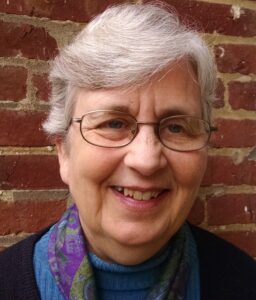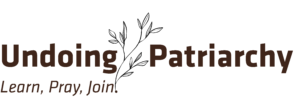Linda Gehman Peachey looks at how women, as well as other marginalized peoples and the broader society, are oppressed by the existence of patriarchy.
This blog is part of the ongoing Learn, Pray, Join: Undoing Patriarchy series.

Linda Gehman Peachey
Photo credit: Titus Peachey
Linda Gehman Peachey lives in Lancaster, Pennsylvania, and is a member of Blossom Hill Mennonite Church. She has a Master of Divinity from Anabaptist Mennonite Biblical Seminary, and a Doctor of Ministry from Lancaster Theological Seminary. Linda was a former director of women’s advocacy for Mennonite Central Committee U.S., and with her husband, Titus, co-director of MCC U.S. Peace and Justice Ministries. She and Titus have two adult daughters and enjoy visiting them in Chicago and Guatemala.
______________________________
I long for a world in which everyone is respected and able to thrive and all are encouraged to live in just and peaceful ways. Sadly, the church has rarely offered such a space.
In my own life, the church has provided a place of belonging, but its embrace of patriarchy has been deeply harmful. Although claiming to offer life and salvation to all, it taught me that women are flawed creatures, who need to be managed and led by men. Men instructed us on how to dress and limited how we could participate in church life. If we dared to speak up or contribute beyond our prescribed roles, we became a problem, a distressing issue to be discussed and debated by the men in charge.
The overriding implication was that there was something fundamentally wrong with us that even Jesus could not fix. Nothing could make us full members in the life of the church. According to these church leaders, God had commanded men to be in charge; this was God’s design.
The spiritual damage to women in such a system is profound and enduring. Many find it hard to believe they are created in God’s image and that God truly loves them.
How does one love such a God or even oneself? How does one pray? How does one respect a God who gives them interests and abilities they are not allowed to use? Or a God who appears to be playing a cruel joke on them? How can one grow and flourish in such a church?
At the same time, patriarchy has told men that they are the norm, with a (divine) right to be seen and heard. They can take up as much space and time as they want. Thus in mixed-gender groups, men still often dominate the discussion. One vivid example of this happened at a church retreat, when people were invited to tell stories from their lives. All the speakers were men! Not one woman felt comfortable sharing or confident that people would want to hear her story. Meanwhile, the men who spoke took all the time they wanted. They had no trouble believing they should speak or that everyone would want to hear what they had to say.
Men are also taught they can and should be leaders, with the right to make decisions and override those who disagree or offer a different perspective. They can become especially defensive if a woman challenges or outperforms them. It’s as if they believe that their perspectives, interests and comforts should always come first.
Dr. Elisabeth A. Horst confirms these findings through interviews with young men and women, discussing how they handled conflict with others. Their responses clearly revealed that women are socialized to pay attention to the feelings and needs of others, and the men were focused first on their own needs and desires. Furthermore, she found that “what men want matters more than what women want.” [1]
It is not surprising, then, that women experience so much physical, emotional and sexual abuse by men. Men are taught to expect their needs to be met, and women are taught to comply. And when men control most leadership positions, there are not good mechanisms for holding them accountable.
Tragically, this binary of women and men, of “serve and be served,” is also reproduced in the broader society. It undergirds white supremacy and the false narrative that people of color should serve white people. It reinforces economic injustice and the dangerous message that the laboring class should serve a wealthy elite. It supports a nationalistic exceptionalism that claims our nation should dominate all others. And it underlies the notion that the earth was made for our consumption, causing little regard for long-term consequences.
These systems harm all of us. While the damage to people in vulnerable positions is more obvious, these structures also injure those in dominant roles. When people’s lives are defined by competition and control, they miss out on hearing other perspectives and the growth that can happen from learning from others. And they miss out on the joy and fulfillment of truly authentic relationships, for it is impossible to build genuine community without mutual respect, honesty and shared work.
Fortunately, the Mennonite Church USA Women in Leadership program is one place that models a different way. Giving priority to the wisdom of women of color, it recognizes that they live at the intersection of all our nation’s oppressive structures and can therefore see our reality most clearly and offer the most constructive remedies. Their ways of being together are inclusive, honest and transparent. And as Ijeoma Oluo encourages, they “define strength and leadership in ways that don’t reinforce abusive patriarchy and white supremacy.”[2]
This is what I long for in the church at large, a community that models the way of Jesus and the truth that God truly loves all people and wants to give them abundant life, a community in which everyone has valuable gifts to share, a community in which everyone belongs. This is my dream, my hope of salvation.
[1] Dr. Elisabeth A. Horst, “Patriarchy: An Experiential Definition,” The ISTI Sun, July 1996, Vol 2 No 3, Interfaith Sexual Trauma Institute, Saint John’s Abbey and University, Collegeville, Minnesota.
[2] Ijeoma Oluo, Mediocre, The Dangerous Legacy of White Male America, New York: Seal Press, 2020, 275.

“Learn, Pray, Join: Undoing Patriarchy” draws attention to the ways in which the current systems in our world and churches create spaces that perpetuate patriarchal norms and do harm to those who fall outside of those norms. This initiative provides tools and resources to help MC USA church communities work toward a more equitable world, in which everyone is treated with the care and respect they deserve, regardless of gender.
You are invited to get involved with Learn, Pray, Join: Undoing Patriarchy.
Support Mennonite Church USA’s Peace and Justice Initiatives by giving here.
The views and opinions expressed in this blog belong to the author and are not intended to represent the views of the MC USA Executive Board or staff.

